How Health Businesses Are Adapting to AI in 2025
AI is fast becoming a key tool for small businesses in Australia. In a recent BizCover survey, 965 small businesses were asked just how they were using, or planning to use, AI.
The Australian Small Business AI Report 2025 explored current AI adoption, future expectations, perceived risks, and the changing skillsets shaping the workforce. The findings offer a snapshot of how small businesses are responding to the rise of AI – from day-to-day operations to hiring decisions and long-term planning.
Of these businesses, 377 of them belonged to the health sector. Out of all industries surveyed, the health sector had the lowest rate of AI adoption, reflecting a very cautious and measured approach. But as technology continues to evolve, it doesn’t look like AI is going anywhere soon. Already embedded in sectors like marketing and consulting, could the health sector be missing out on a major opportunity that other industries have already taken advantage of?
The below report details findings from 377 businesses in the health sector, giving a rounded view on their stance towards AI, alongside commentary from BizCover’s Head of Marketing Sharon Kenny.
Key takeaways
- Cautious adoption with lowest current use: Only 51% of small health businesses currently use AI – the lowest adoption rate across all sectors surveyed, with nearly one-third (32%) having no plans to adopt AI due to privacy, ethics, and regulatory concerns.
- AI as a support tool: 42% believe AI cannot replace any tasks or roles in their business, and most use AI primarily for admin and client communications rather than clinical decision-making or patient care.
- Soft skills seen as most at risk: Communication and customer service are key relied-on skills in health, yet 43% of respondents expect interpersonal and social skills to decline due to AI, highlighting concerns over the impact on human-centric care.
- Significant skills challenges but mixed impact outlook: Nearly 70% report difficulty sourcing skilled professionals, yet there is uncertainty about AI’s future impact, with 47% feeling positive but 40% remaining neutral or unsure.
- Strong preference for human expertise: Health professionals show the highest resistance to AI fully replacing tasks or roles, with 27% stating they’d never consider replacing hiring or outsourcing with AI, underscoring the essential role of human judgement in healthcare.
AI adoption in the health sector: Current usage and trends
One-third (32%) of healthcare businesses have no plans to adopt AI in the future. Only 51% of health sector respondents currently use AI, which is the lowest adoption rate across all sectors (which include Marketing, ICT, Consulting, Architects, Retail and Accounting).
This is in stark contrast to Marketing, where 91% of respondents in that sector said they were either using or planning to use AI.
Sharon Kenny is the Head of Marketing at BizCover. “The numbers show that healthcare professionals are cautious about AI adoption, balancing innovation with the need to protect patient trust and privacy,” she says.
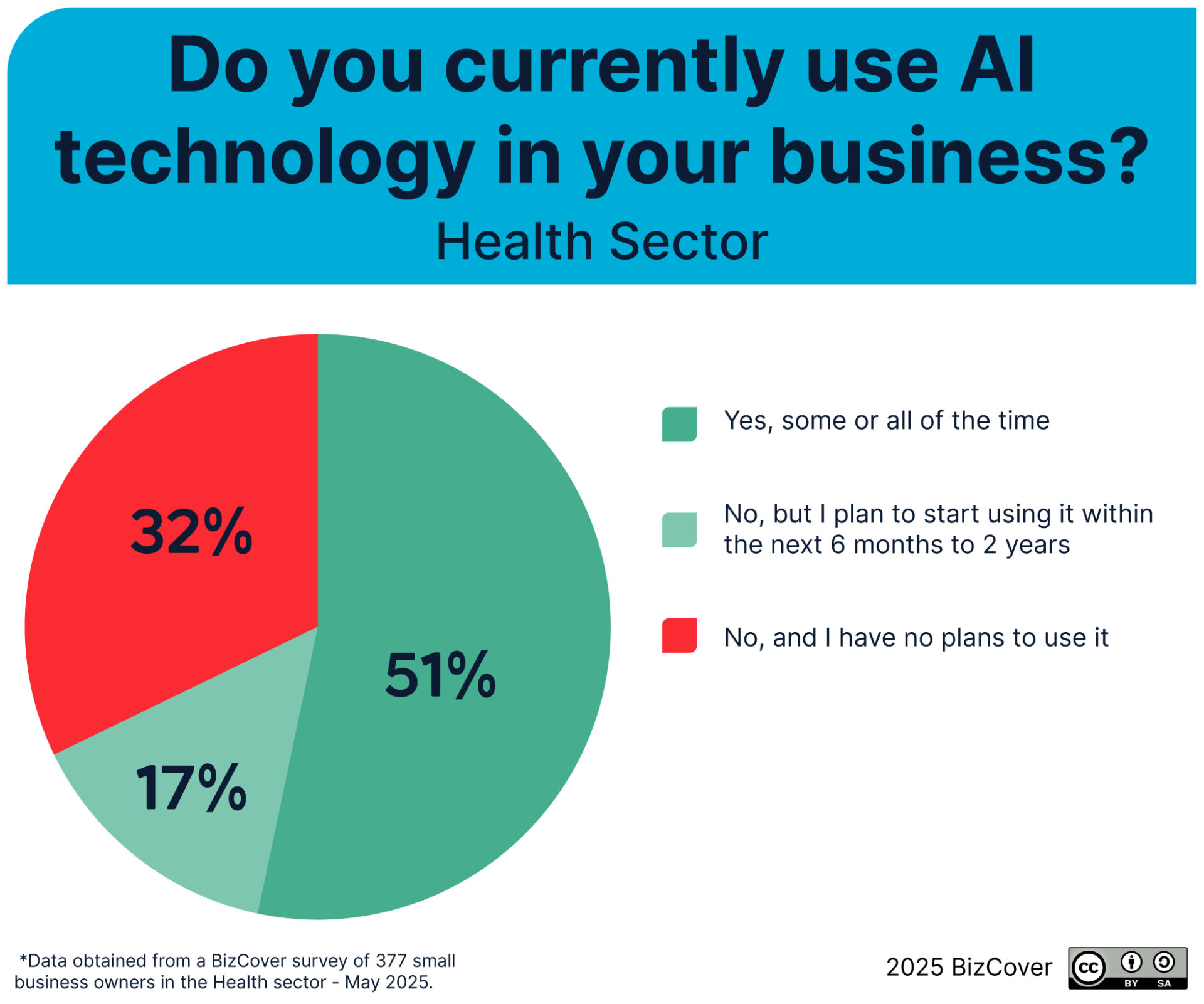
AI usage within health businesses
The most common tasks AI is used for within healthcare business is:
- Client and external communications (e.g., writing emails).
- Problem-solving and AI assistance (e.g., guidance, support, ideation and research).
- Marketing, content creation and copywriting.
Based on this information, AI in the healthcare sector is most commonly used as a support tool for non-clinical functions rather than for direct patient care or clinical decision-making.
Kenny comments, “In healthcare, AI is valued as a practical tool to ease administrative burdens and improve patient communication. By utilising AI, this frees up time for clinicians to focus on quality care.”

Barriers to AI adoption in health
While AI adoption is growing across many industries, health businesses are taking a more measured approach. The top three reasons cited for not adopting AI are:
- AI is not relevant to my business needs.
- I am not sure how AI works or how to use it.
- Privacy, ethics, and regulatory compliance concerns.
The top two reasons most commonly cited suggest that healthcare businesses are open to AI, but are just unsure about its relevance and practical application. The perception that AI doesn’t suit their business model may stem from the fact that many off-the-shelf solutions are built for general use, rather than tailored to the healthcare industry’s unique needs.
However, privacy, ethics and regulatory compliance still remain a top concern. This underscores the importance of protecting sensitive patient information in an increasingly digital world.
“Health professionals aren’t necessarily saying no to AI,” says Kenny. “But first, they want to know how it works, whether it’s safe, and how it can add value. This shows that there needs to be more education and clearer use cases for the health industry.”
Ongoing upskilling and reskilling will be essential for building confidence within healthcare. With the right training and support, healthcare workers can integrate AI into their workflows in ways that enhance communication, ease admin pressures, and ultimately help improve patient outcomes without compromising care quality.
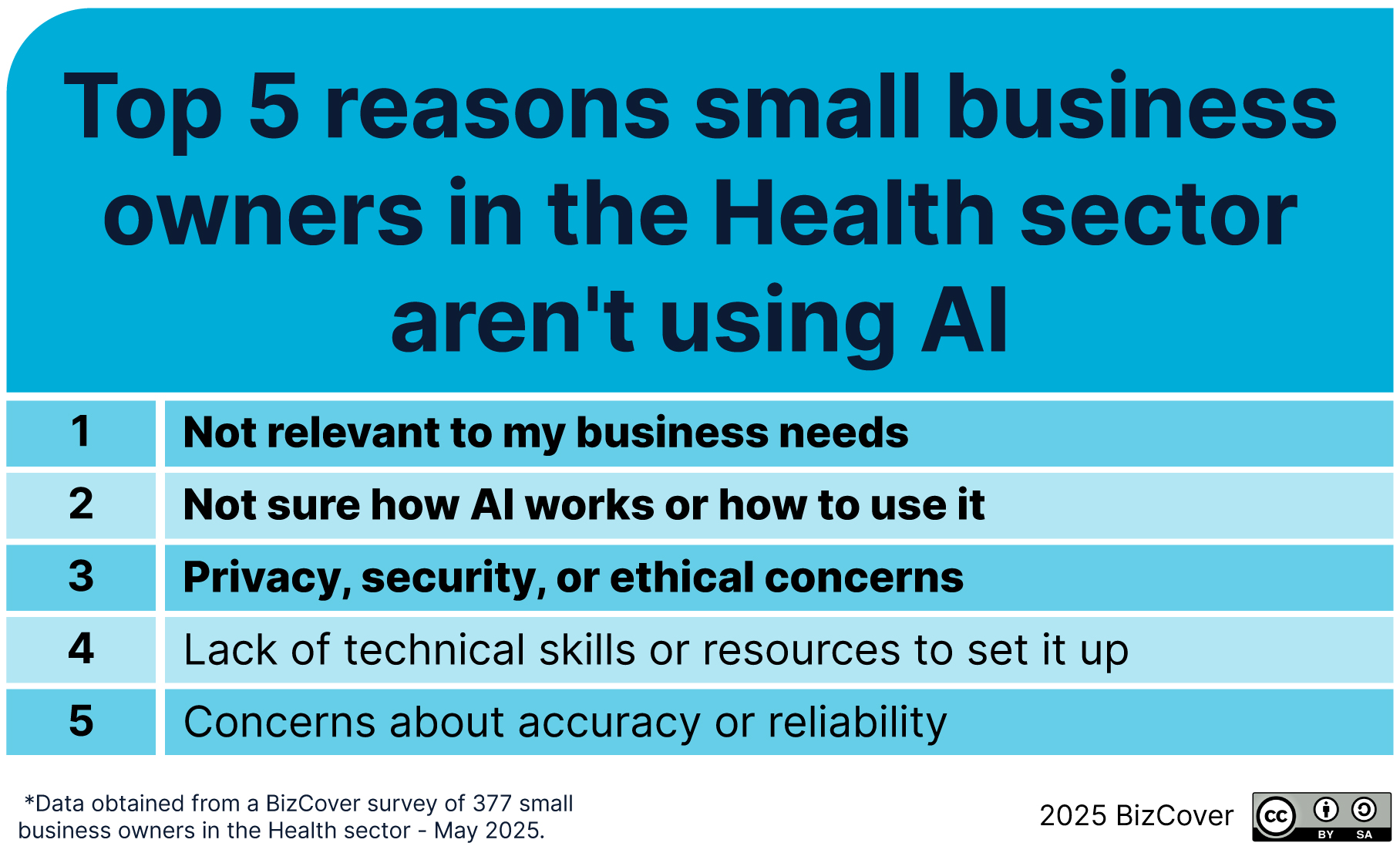
AI’s importance to daily operations in health
Among all the sectors surveyed, the health industry is the most cautious when it comes to AI. Fewer than half of health business owners view AI as important to how they work, making it the only sector where sentiment leans away from AI as a core operational tool.
Only 8% of healthcare respondents consider AI to be “absolutely essential” to their daily operations. This figure is significantly lower compared to other industries like Marketing, where 32% say AI is absolutely essential. This suggests a much slower integration curve in the healthcare industry.
Based on the report’s figures, it seems that the hesitation around AI could primarily be focused around putting patient safety first.
“It seems like health business owners are taking a cautious but responsible approach,” says Kenny. “They understand the risks of mismanaging patient data and want to ensure that any technology they adopt not only complies with strict regulations but also protects their patients.”
While it doesn’t seem healthcare businesses are outright rejecting AI, they are taking a very measured approach towards integrating it into daily operations.
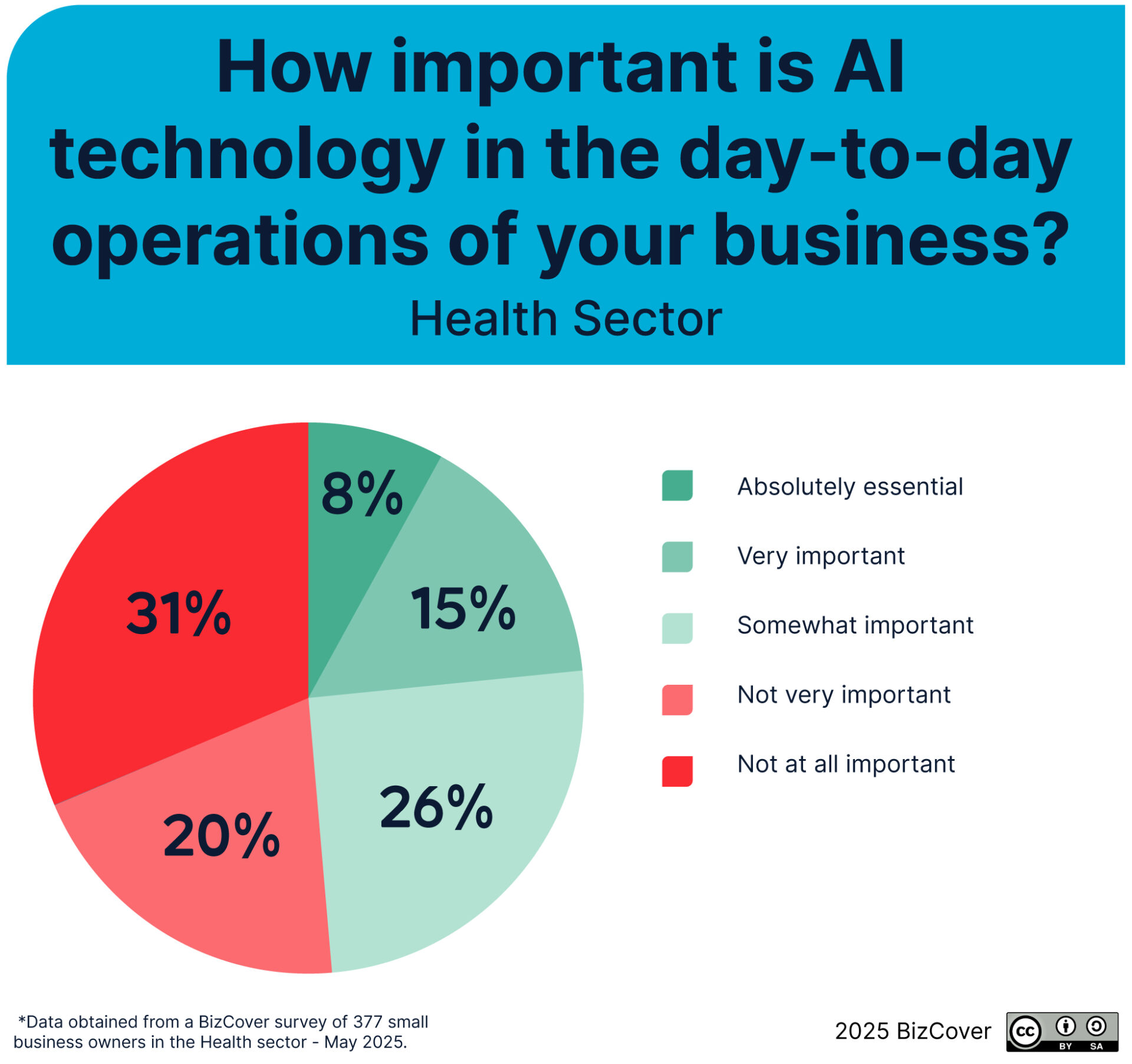
AI’s impact on skills in the health sector
Around 66% of health business owners say they have trouble finding skilled professionals, with 28% struggling to find candidates with both hard and soft skills. Communication, problem-solving, critical thinking, and customer service are the most relied-upon skills in the sector, according to the report.
Many are actively upskilling to stay competitive: 36% are improving communication, while 30% are focusing on creativity and innovation. However, 26% say they’re not learning any new skills, which could widen capability gaps as AI adoption grows.
Looking ahead, the sector appears divided. Some are cautious but optimistic, while others show uncertainty and concern around automation. 30% believe AI will create demand for entirely new skillsets within the next 3–5 years and 42% expect AI to reduce the need for some existing skills. 40% of people are still uncertain about what the future holds and how AI will reshape the healthcare workforce.
“As AI becomes more integrated in health, balancing technical upskilling with strong communication and collaboration will be critical. Like with any industry, healthcare organisations that prioritise continuous learning and adaptability will be best placed to navigate these changes,” says Kenny.
Will AI replace humans in healthcare?
Health professionals are taking a firm stance when it comes to the role of AI in replacing people. 42% of respondents believe AI cannot replace any tasks or job roles within their business, which is the highest level of resistance across all sectors. This reflects a strong belief in the value of human expertise, judgment and empathy in healthcare.
Most health businesses see AI as a support tool, not a substitute. 46% say AI could help with tasks (such as admin or scheduling) but not full job roles. Only 12% believe AI could replace both, reinforcing the idea that while automation has a role to play, there are clear limits in a human-centric industry like healthcare.
This cautious mindset also shows in hiring decisions. 27% of health businesses say they would never replace hiring or outsourcing with AI (which is, again, the highest of any industry surveyed).
However, as discussed above, some businesses within the industry report facing workforce shortages in both hard and soft skills (28%).
“These numbers show us that many people within the healthcare industry believe that human judgement and knowledge will always remain central in healthcare,” says Kenny. “But the numbers also prove that there is an opportunity for AI to fill certain skill gaps.”
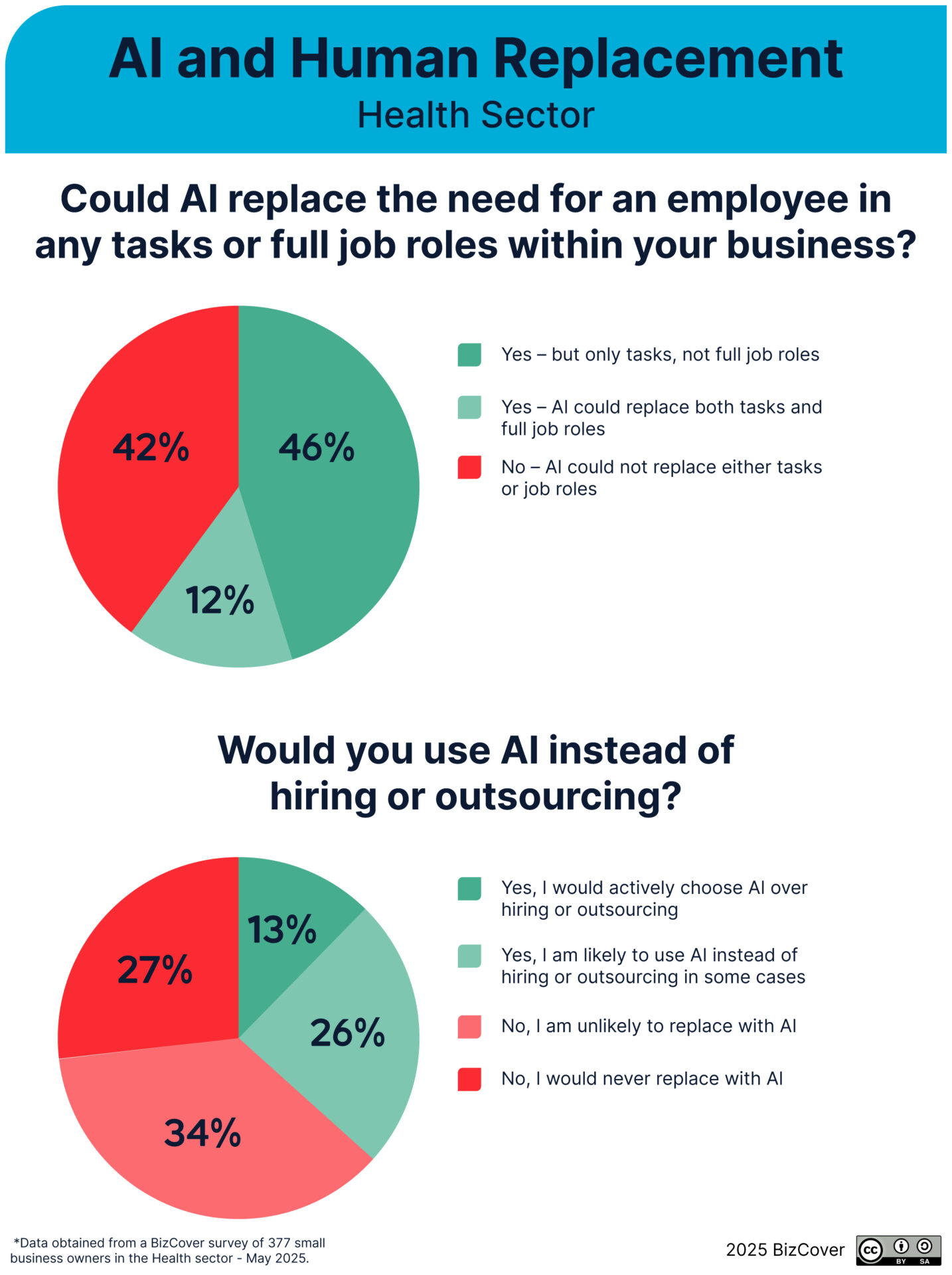
The most replaceable roles in health
When it comes to which tasks AI could potentially replace in healthcare, respondents clearly indicated that mainly back-office and data-focused roles were the ones at risk. This mirrors broader trends in AI adoption, where repetitive, process-driven tasks are the first to be automated.
Importantly, no hands-on medical or caregiving roles appeared on the list. This reinforces the message from health professionals that AI can assist with tasks, but it can’t replace human care.
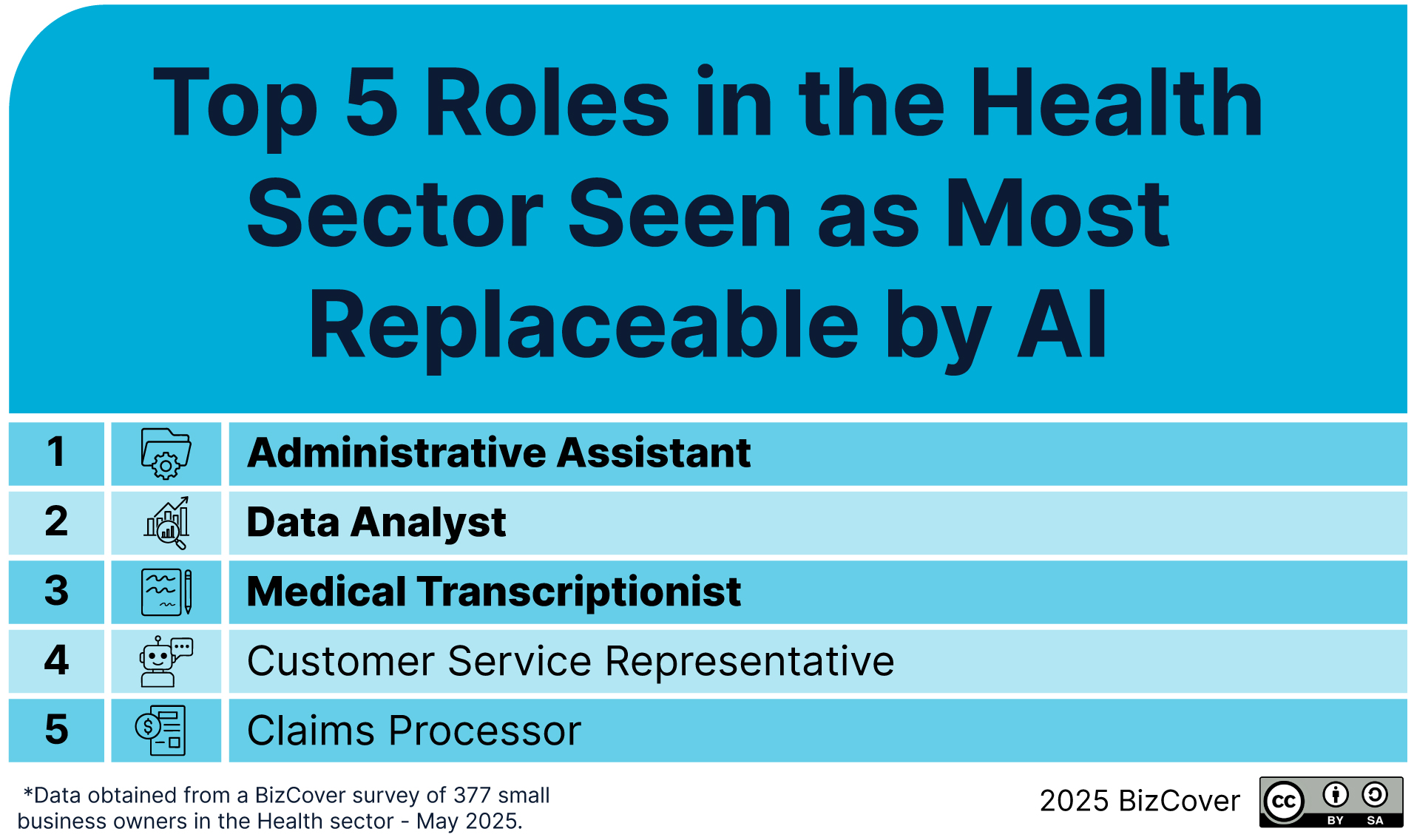
The health sector’s outlook on AI’s future
Nearly half (47%) of respondents feel positive about AI’s potential in healthcare, particularly in areas like reducing administrative workloads and boosting efficiency.
“What this says is that AI represents a practical solution to streamline back-end operations without compromising the human touch in patient care,” says Kenny.
However, a significant portion of people remain neutral (40%), effectively creating what could be described as a “soft barrier” to adoption. Rather than rejecting AI outright, many health professionals appear to be happy to wait and see, holding off until they better understand how AI fits into their work.
“This figure clearly highlights a need for more education, tailored guidance, and proven healthcare-specific use cases to build confidence in AI usage,” says Kenny.
A smaller group (13%) express negative views, mainly around concerns that AI could undermine job relevance or contribute to a decrease in essential skills.
Looking ahead, 42% believe AI will reduce the need for some current skills, while 30% expect it will create demand for entirely new ones. Only 12% anticipate no change, suggesting that most health professionals see a shift coming – they’re just not sure what that could look like yet.
Conclusion: Healthcare’s approach to AI is measured and cautious
While AI is becoming essential across many industries, healthcare faces unique challenges. Privacy, ethics and strict regulatory requirements make AI adoption more complex, especially in environments where patient trust and care quality are of the highest concern.
In healthcare, the data shows that AI is largely seen as a support tool – helping with admin, data management, and communications – rather than something that could replace clinicians or caregiving roles. It seems that healthcare business owners remain firm in their belief that human judgement, empathy, skills and knowledge are irreplaceable when it comes to patient care.
At the same time, the health workforce is adapting. There’s a growing need for technical skills to work effectively alongside AI, balanced by strong demand for interpersonal and communication skills that technology simply can’t replicate.
Overall, small health businesses are cautiously optimistic. They are open to AI’s potential to improve efficiency, but only if it aligns with their values and is able to enhance (not replace) human care.
Need support navigating digital tools or business protection in a changing landscape?
At BizCover, we support thousands of health businesses with quick and easy business insurance quotes, so you can focus on providing the best possible care to your patients. For on the go cover, go BizCover.
Find more data from small businesses across all sectors in The Australian Small Business AI Report 2025.
Methodology
This research was conducted via an online survey distributed to Australian business owners in April 2025. A total of 1,323 responses were collected. For the purposes of this analysis, only responses from small business owners (defined as those with 20 or fewer employees) were included, bringing the final sample size to 965.
These respondents represented seven industries, after excluding two industries with low response rates (fewer than 50 responses each) to ensure meaningful comparison. The remaining industries include Marketing and Communications, Consulting and Strategy, ICT, Healthcare and Medical, and others. There were 377 respondents from the Health sector.
Respondents were asked a mix of multiple choice and checkbox questions covering AI adoption, its impact on operations and roles, and evolving skill requirements. The data has been analysed to highlight trends across small business owners, industries, and anticipated future use of AI in the small business sector.
© 2025 BizCover Pty Limited, all rights reserved. ABN 68 127 707 975; AFSL 501769
This information is general only and does not take into account your objectives, financial situation or needs. It should not be relied upon as advice. As with any insurance, cover will be subject to the terms, conditions and exclusions contained in the policy wording or Product Disclosure Statement (available on our website). Please consider whether the advice is suitable for you before proceeding with any purchase. Target Market Determination document is also available (as applicable). © 2026 BizCover Pty Limited, all rights reserved. ABN 68 127 707 975; AFSL 501769.


![[Press Release] Extreme weather poses growing threat to Australian businesses as storm and fire season approach](https://www.bizcover.com.au/wp-content/uploads/Press-Release-Extreme-weather-poses-growing-threat-to-Australian-businesses-as-storm-and-fire-season-approach-1.jpg)
